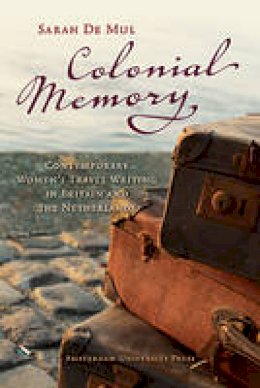
Stock image for illustration purposes only - book cover, edition or condition may vary.
Colonial Memory: Contemporary Women's Travel Writing in Britain and the Netherlands
Sarah de Mul
€ 37.82
FREE Delivery in Ireland
Description for Colonial Memory: Contemporary Women's Travel Writing in Britain and the Netherlands
Paperback. .
Exploring the intersections between memory, gender and the postcolonial, Colonial Memory starts with the observation of a widespread cultural recall of colonial scenes and topics, a compulsion to return to the colonies that follows the belatedness of the postcolonial moment. Focusing on Britain and the Netherlands, the author explores the phenomenon of colonial memory through the specific genre of women's travel writing. De Mul criticizes postcolonial studies for its tendency to engage with general and abstract allegories of self and other, which she seeks to substitute with historicized accounts of the cultural frames that shape the contacts between Britain and the Netherlands and their respective (former) colonies, both in the past and the present.
Product Details
Publisher
Amsterdam University Press
Format
Paperback
Publication date
2014
Condition
New
Number of Pages
180
Place of Publication
Amsterdam, Netherlands
ISBN
9789089642936
SKU
V9789089642936
Shipping Time
Usually ships in 4 to 8 working days
Ref
99-1
About Sarah de Mul
Sarah De Mul is a Postdoctoral Fellow at the Flanders Research Foundation in the Department of Literary Studies at Leuven University.
Reviews for Colonial Memory: Contemporary Women's Travel Writing in Britain and the Netherlands
With Colonial Memory Sarah de Mul gives her readers] a vividly conceived and theoretically astute reading of the complicated weavings between the past and the present involved in memory work and the process of nostalgic return
processes heightened when experience of colonialism casts memory adrift in space as well as in time.-Elleke Boehmer, Professor in World Literature in English, University of Oxford - Sarah de Mul's brilliant contribution to postcolonial studies gives us the most insightful readings of women travellers returning to the colonial past. By focusing on the return travel narratives of Aya Zikken, Marion Bloem and Doris Lessing, she demonstrates that the colonial past does not seem to pass, but, instead, instigates a compulsion to return. De Mul's work will stand out in the literature devoted to the postcolonial literature as the first convincing feminist exploration of colonial histories and contemporary post-imperial conditions.
Ernst van Alphen, professor of Literary Studies Leiden University - Sarah de Mul's elegant analysis of the 'complex architecture' of colonial remembrance is to be welcomed not only for its lucidly and theoretically sophisticated contribution to the burgeoning field of memory studies but also for its groundbreaking comparative analysis of Dutch and British modes of imperial nostalgia.
Sam Durrant, Senior Lecturer in Postcolonial Literature at Leeds University - Colonial Memory explores 20th century women's travel writing in English and Dutch . Focusing on writers Aya Zikken, Marion Bloem and Doris Lessing, de Muhl explores the way that post-colonial nations such as Britain and the Netherlands seem compelled to return to their colonial past. This focus on the Dutch empire and its legacy in contemporary women's writing is a new perspective within post-colonial studies and serves to make more complex and more particular the analysis of post-colonial writings. This interdisciplinary study explores issues of gender identity in relation to post-colonialism and constitutes an engagement with post-colonial theory.
Sarah Mills
processes heightened when experience of colonialism casts memory adrift in space as well as in time.-Elleke Boehmer, Professor in World Literature in English, University of Oxford - Sarah de Mul's brilliant contribution to postcolonial studies gives us the most insightful readings of women travellers returning to the colonial past. By focusing on the return travel narratives of Aya Zikken, Marion Bloem and Doris Lessing, she demonstrates that the colonial past does not seem to pass, but, instead, instigates a compulsion to return. De Mul's work will stand out in the literature devoted to the postcolonial literature as the first convincing feminist exploration of colonial histories and contemporary post-imperial conditions.
Ernst van Alphen, professor of Literary Studies Leiden University - Sarah de Mul's elegant analysis of the 'complex architecture' of colonial remembrance is to be welcomed not only for its lucidly and theoretically sophisticated contribution to the burgeoning field of memory studies but also for its groundbreaking comparative analysis of Dutch and British modes of imperial nostalgia.
Sam Durrant, Senior Lecturer in Postcolonial Literature at Leeds University - Colonial Memory explores 20th century women's travel writing in English and Dutch . Focusing on writers Aya Zikken, Marion Bloem and Doris Lessing, de Muhl explores the way that post-colonial nations such as Britain and the Netherlands seem compelled to return to their colonial past. This focus on the Dutch empire and its legacy in contemporary women's writing is a new perspective within post-colonial studies and serves to make more complex and more particular the analysis of post-colonial writings. This interdisciplinary study explores issues of gender identity in relation to post-colonialism and constitutes an engagement with post-colonial theory.
Sarah Mills
